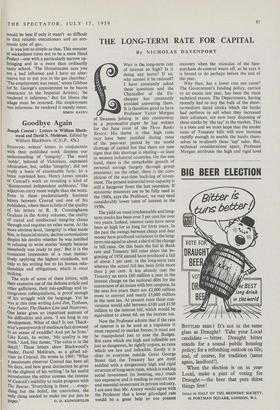Goodbye Again
Joseph Conrad : Letters to William Black- wood and David S. Meldrum. Edited by
STUDYING writers' letters in conjunction with their published work deepens our understanding of 'integrity'. The word `noble', beloved of Victorians, expressed admiration, but, unlike 'integrity', did not Imply a basis of examinable facts. In a letter reprinted here, Henry James speaks of Conrad's work as revealing a kind of `disinterested independent nobleness.' The adjectives carry more weight than the noun. Even in these predominantly business letters between Conrad and one of his publishers, where there is little of the quality of his letters to R. B. Cunninghame Graham in the Aubry volumes, the reality of moral and intellectual integrity shines through and requires no other name. At the More obvious level, 'integrity' is what made him, in financial straits, decline commissions despite his doubts whether he was justified in refusing to write stories 'simply because somebody was ready to pay.' But it is the consistent impression of a man instinc- tively applying the highest standards, not only to his writing but to his human rela- tionships and obligations, which is most striking.
The style of some of these letters, with their excessive use of the definite article and other gallicisms, their mis-spellings and in- congruous colloquialisms, is proof enough of his struggle with the language. Yet he Was at this time writing Lord Jim, Typhoon, 40ty Foster, The Shadow Line and Nostromo. One letter gives an important account of his difficulties and aims. 'I am long in my development. What of that? Is not Thack- eray's pennyworth of mediocre fact drowned in an ocean of twaddle? And yet he lives.' Like Keats, he writes, 'My quality is my truth.' And, like James, 'The value is in the detail.' These letters show Blackwood's reader, David Meldrum, as a gifted ad- viser to Conrad. He wrote in 1905: 'What a passionate observer Conrad has been all his days, and how great distinction he gives to the slightest of his writing.' In his useful introduction the editor stresses the interest of Conrad's inability to make progress with The Rescue. `Everything is there . . .every- thing but the belief, the conviction, the only thing needed to make me put pen to






































 Previous page
Previous page